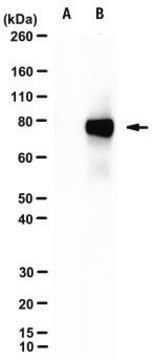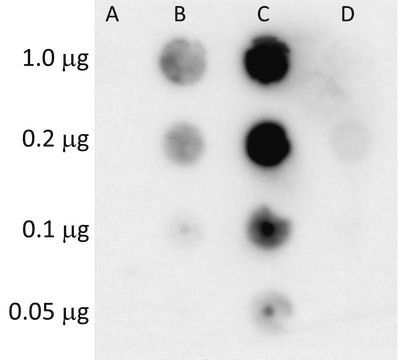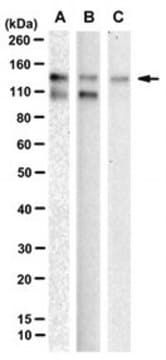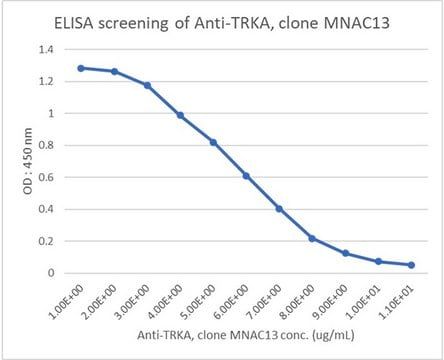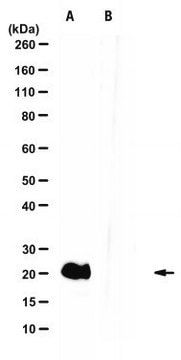MABF3136
Anti-IL-11 Antibody, clone 13-6D-10G
Manufacturer: Sigma Aldrich
Synonym(S): Interleukin-11
Select a Size
| Pack Size | SKU | Availability | Price |
|---|---|---|---|
| 25 μL | MABF3136-25-μL | In Stock | ₹ 13,779.99 |
| 100 μL | MABF3136-100-μL | In Stock | ₹ 34,740.00 |
MABF3136 - 25 μL
In Stock
Quantity
1
Base Price: ₹ 13,779.99
GST (18%): ₹ 2,480.398
Total Price: ₹ 16,260.388
biological source
rat
Quality Level
200
antibody form
purified antibody
antibody product type
primary antibodies
clone
13-6D-10G, monoclonal
mol wt
calculated mol wt 21.52 kDaobserved mol wt ~20 kDa
purified by
using protein G
species reactivity
mouse
packaging
antibody small pack of 100 μL
technique(s)
inhibition assay: suitablewestern blot: suitable
Related Products
Description
- General description: Interleukin-11 (UniProt: P47873 ; also known as IL-11) is encoded by the Il11 gene (Gene ID: 16156) in murine species. IL-11 is member of the IL-6 family of cytokines that is synthesized with a signal peptide (aa 1-21), which is subsequently cleaved off to produce mature secreted protein. It is involved in a variety of biological responses, including hematopoiesis, bone development, and carcinogenesis. Its actions are mediated via interaction with IL-11 receptor that is composed of IL-11R and gp130. Binding of IL-11 to its receptor induces the activation of JAK that phosphorylates STAT3, which then translocates to the nucleus and activates transcription of various genes. IL-11 is reported to promote the proliferation of hepatocytes in response to liver damage. In mice subjected to liver injury, IL-11 is mainly produced by hepatocytes in response to reactive oxygen species (ROS) released from dying hepatocytes. Secreted IL-11 then induces STAT3 phosphorylation in adjacent healthy hepatocytes resulting in their compensatory proliferation. It has been reported that IL-11 production in dying hepatocytes depended on ERK2 that phosphorylates Fra-1 and prevents its proteasomal degradation. Fra-1 is subsequently recruited to the Il11 promoter and activates transcription. Clone 13-6D-10G (13) displays neutralizing activity against mIL-11. It blocks mIL-11-induced, but not mIL-6-induced the proliferation of T1165 cells. Preincubation of murine IL-11 with this clone is shown to completely inhibit STAT3 phosphorylation. (Ref.: Deguchi, Y., et al. (2018). Biochem. Biophys. Res. Commun. 505(2); 453-459; Nishina, T., et al. (2012). Sci. Signal. 5(207); ra5).
- Specificity: Clone 13-6D-10G is a rat monoclonal antibody that detects murine IL-11.
- Immunogen: FLAG-tagged full-length recombinant murine IL-11 produced in HEK293T cells transfected with pcDNA3-mIl11.
- Application: Quality Control TestingEvaluated by Western Blotting in HEK293T cells transiently transfected with mIL-11.Western Blotting Analysis (WB): A 1:250 dilution of this antibody detected IL-11 in HEK293T cells transiently transfected with mIL-11, but not in wild-type HEK293T cells.Tested ApplicationsInhibition Assay: A representative lot inhibited mIL-11 induced STAT3 phosphorylation and T1165 cell proliferation. (Deguchi, Y., et al. (2018). Biochem Biophys Res Commun. 505(2):453-459). Western Blotting Analysis: A representative lot detected IL-11 in Western Blotting applications (Deguchi, Y., et al. (2018). Biochem Biophys Res Commun. 505(2):453-459).Note: Actual optimal working dilutions must be determined by end user as specimens, and experimental conditions may vary with the end user.
- Physical form: Purified rat monoclonal antibody IgG1 in PBS without azide.
- Reconstitution: 0.5 mg/mL. Please refer to guidance on suggested starting dilutions and/or titers per application and sample type.
- Storage and Stability: Store at -10°C to -25°C. Handling Recommendations: Upon receipt and prior to removing the cap, centrifuge the vial and gently mix the solution. Aliquot into microcentrifuge tubes and store at -20°C. Avoid repeated freeze/thaw cycles, which may damage IgG and affect product performance.
- Other Notes: Concentration: Please refer to the Certificate of Analysis for the lot-specific concentration.
- Disclaimer: Unless otherwise stated in our catalog or other company documentation accompanying the product(s), our products are intended for research use only and are not to be used for any other purpose, which includes but is not limited to, unauthorized commercial uses, in vitro diagnostic uses, ex vivo or in vivo therapeutic uses or any type of consumption or application to humans or animals.
SAFETY INFORMATION
WGK
WGK 2
Flash Point(F)
Not applicable
Flash Point(C)
Not applicable
Compare Similar Items
Show Difference
biological source: rat
Quality Level: 200
antibody form: purified antibody
antibody product type: primary antibodies
clone: 13-6D-10G, monoclonal
mol wt: calculated mol wt 21.52 kDaobserved mol wt ~20 kDa
purified by: using protein G
species reactivity: mouse
packaging: antibody small pack of 100 μL
technique(s): inhibition assay: suitablewestern blot: suitable
biological source:
rat
Quality Level:
200
antibody form:
purified antibody
antibody product type:
primary antibodies
clone:
13-6D-10G, monoclonal
mol wt:
calculated mol wt 21.52 kDaobserved mol wt ~20 kDa
purified by:
using protein G
species reactivity:
mouse
packaging:
antibody small pack of 100 μL
technique(s):
inhibition assay: suitablewestern blot: suitable
biological source: mouse
Quality Level: 200
antibody form: purified antibody
antibody product type: primary antibodies
clone: M957, monoclonal
mol wt: calculated mol wt 33.21 kDaobserved mol wt ~44 kDa
purified by: using protein G
species reactivity: rabies virus
packaging: antibody small pack of 100 μg
technique(s): __
biological source:
mouse
Quality Level:
200
antibody form:
purified antibody
antibody product type:
primary antibodies
clone:
M957, monoclonal
mol wt:
calculated mol wt 33.21 kDaobserved mol wt ~44 kDa
purified by:
using protein G
species reactivity:
rabies virus
packaging:
antibody small pack of 100 μg
technique(s):
__
biological source: mouse
Quality Level: 200
antibody form: purified antibody
antibody product type: primary antibodies
clone: M953, monoclonal
mol wt: calculated mol wt 33.21 kDaobserved mol wt ~44 kDa
purified by: using protein G
species reactivity: rabies virus
packaging: antibody small pack of 100 μg
technique(s): __
biological source:
mouse
Quality Level:
200
antibody form:
purified antibody
antibody product type:
primary antibodies
clone:
M953, monoclonal
mol wt:
calculated mol wt 33.21 kDaobserved mol wt ~44 kDa
purified by:
using protein G
species reactivity:
rabies virus
packaging:
antibody small pack of 100 μg
technique(s):
__
biological source: mouse
Quality Level: 200
antibody form: purified antibody
antibody product type: primary antibodies
clone: 8C11, monoclonal
mol wt: calculated mol wt 99.81 and 97.04 kDaobserved mol wt ~105 and 130 kDa
purified by: using protein G
species reactivity: hamster, human
packaging: antibody small pack of 100 μg
technique(s): __
biological source:
mouse
Quality Level:
200
antibody form:
purified antibody
antibody product type:
primary antibodies
clone:
8C11, monoclonal
mol wt:
calculated mol wt 99.81 and 97.04 kDaobserved mol wt ~105 and 130 kDa
purified by:
using protein G
species reactivity:
hamster, human
packaging:
antibody small pack of 100 μg
technique(s):
__
